Key takeaways
- Portland’s writers community fosters support and diversity, creating an environment where vulnerability and shared experiences lead to collective growth.
- Feedback in writing workshops is essential, offering both encouragement and constructive critique, transforming the writing process into a collaborative journey.
- Hazel’s workshops provide a safe space for exploration, utilizing various formats that inspire creativity and prevent writing ruts.
- Effective feedback involves listening, capturing positive insights, and experimenting with suggestions, making the revision process enjoyable and less daunting.
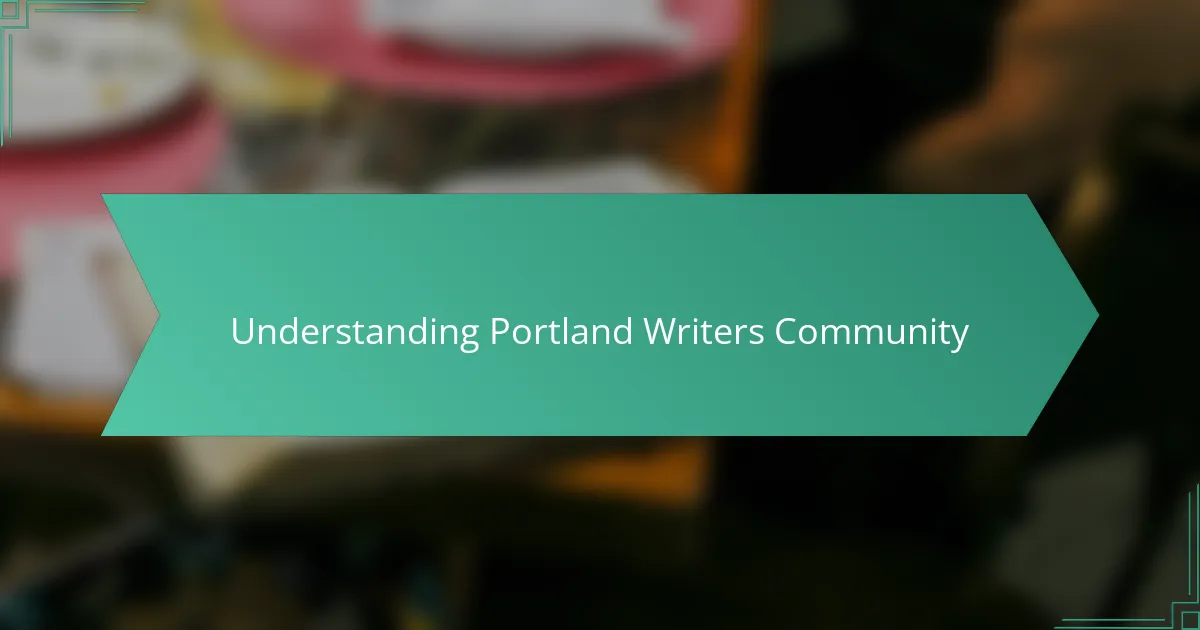
Understanding Portland Writers Community
Portland’s writers community feels like a close-knit family to me, where creativity flows as freely as the Willamette River. Have you ever walked into a room filled with writers who instantly understand your passion without needing many words? That’s been my experience here — a shared energy that’s both comforting and inspiring.
What strikes me most is how supportive and diverse the group is. From poets to novelists, everyone brings their unique voice and story. It makes me wonder: how often do we find spaces where such variety feeds into collective growth rather than competition?
Sometimes, I think the real magic of this community lies in its willingness to embrace vulnerability. Sharing unfinished work or raw ideas isn’t easy, but here, it’s met with encouragement instead of judgment. This openness, in my view, is what turns a gathering of writers into a true community.
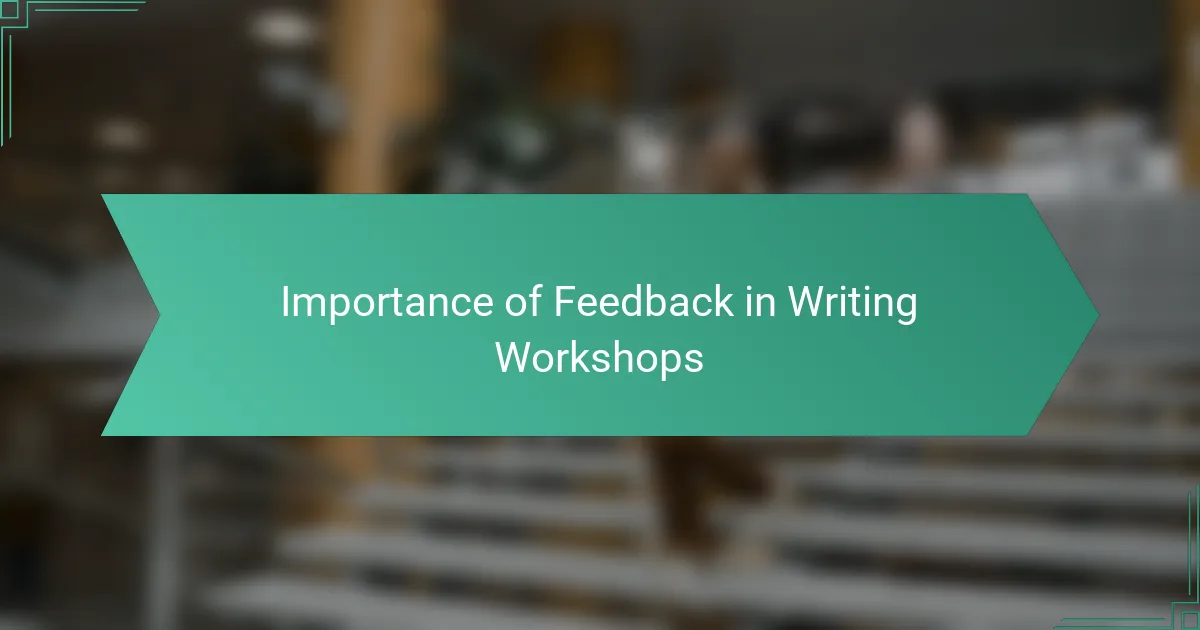
Importance of Feedback in Writing Workshops
Feedback in writing workshops is like a mirror reflecting parts of our work we might overlook. I remember at Hazel’s workshop, a simple comment on a character’s motivation opened my eyes to new depths I hadn’t considered. Isn’t it incredible how another perspective can breathe life into what we thought was finished?
What I find most valuable about feedback is its dual nature—it challenges us while also affirming our strengths. When someone points out what resonates in our writing, it boosts our confidence; when they suggest improvements, it pushes us to grow. Have you ever felt that perfect blend of encouragement and constructive critique? That’s where real progress happens.
In these workshops, feedback feels less like criticism and more like a conversation. It’s a chance to explore ideas collectively, making the writing process less lonely. From my experience, this exchange is essential—not just for the story on the page, but for the writer behind it.
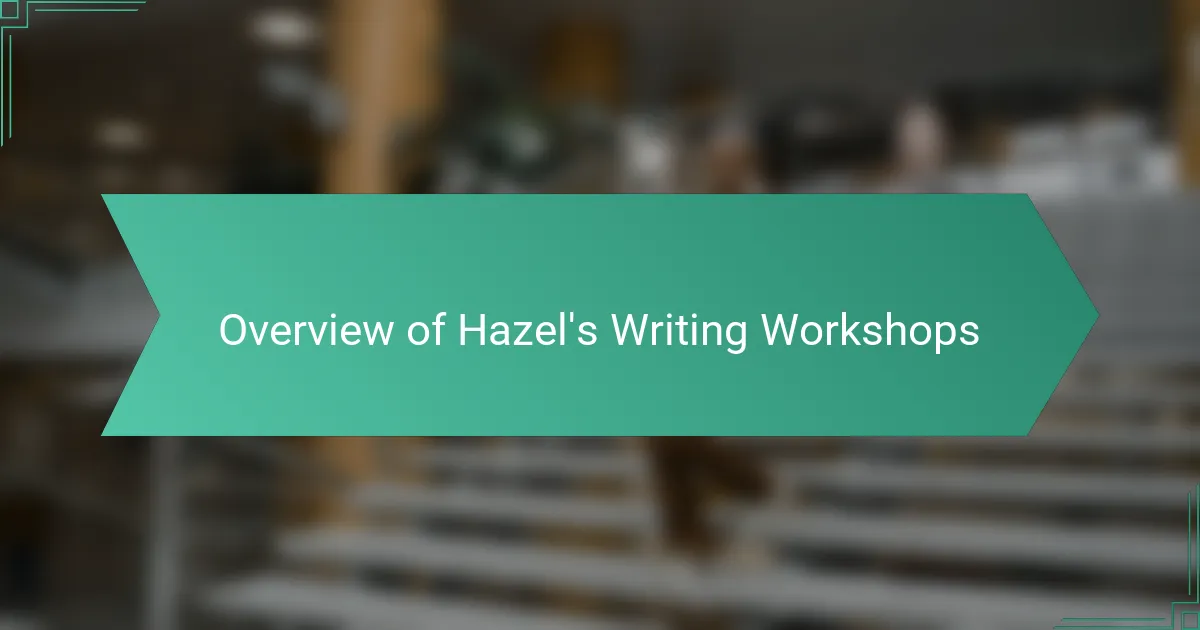
Overview of Hazel’s Writing Workshops
Hazel’s writing workshops are, in many ways, the heart of Portland’s creative energy. When I first joined, I wasn’t sure what to expect, but I quickly found that each session is thoughtfully structured to balance both individual exploration and group interaction. Have you ever been in a space where the rhythm of sharing and listening feels just right? That’s exactly how Hazel’s workshops flow.
What I appreciate most is the variety of formats Hazel uses—sometimes it’s freewriting prompts, other times it’s deep dives into manuscript pieces. This mix keeps things fresh and allows me to stretch different writing muscles. From my experience, having that blend sparks new ideas and helps avoid the writing rut we all dread.
Beyond the activities, Hazel’s warmth and attentiveness create an atmosphere where vulnerability isn’t just accepted; it’s celebrated. That sense of safety means I’m more willing to take risks with my work and expose its raw edges. Isn’t that the kind of environment every writer needs to truly grow? For me, Hazel’s workshops have become that indispensable creative sanctuary.
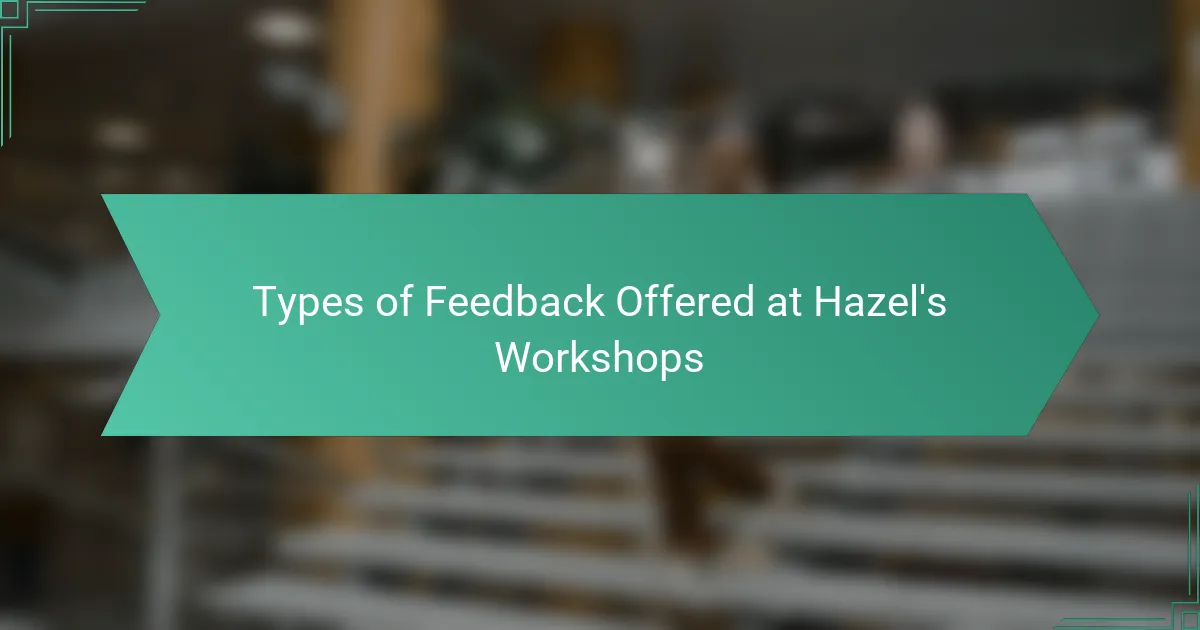
Types of Feedback Offered at Hazel’s Workshops
At Hazel’s workshops, feedback comes in many shapes, but what stands out to me is how thoughtfully each type is tailored to the writer’s needs. Sometimes, the feedback is direct and focused on specific elements like plot structure or character development, giving me concrete takeaways to work with. Other times, it’s more open-ended, inviting reflection rather than immediate fixes—have you ever received that kind of feedback that sparks a deeper question rather than just an answer?
I also notice that Hazel encourages us to give and receive both verbal and written feedback, which creates a richer dialogue. There’s something powerful about hearing someone’s immediate reaction, yet having their thoughtful notes to revisit later. Personally, this combination has helped me catch nuances in my writing that I would have missed if I only had one form of input.
Moreover, peer feedback is a cornerstone of these workshops, and it’s striking how peers balance honesty with encouragement. It’s not about tearing down my work but about lifting it up in ways I hadn’t imagined. Isn’t that the kind of feedback that feels like a collaboration rather than a critique? That mindset transforms each session into a collective journey rather than a solo struggle.
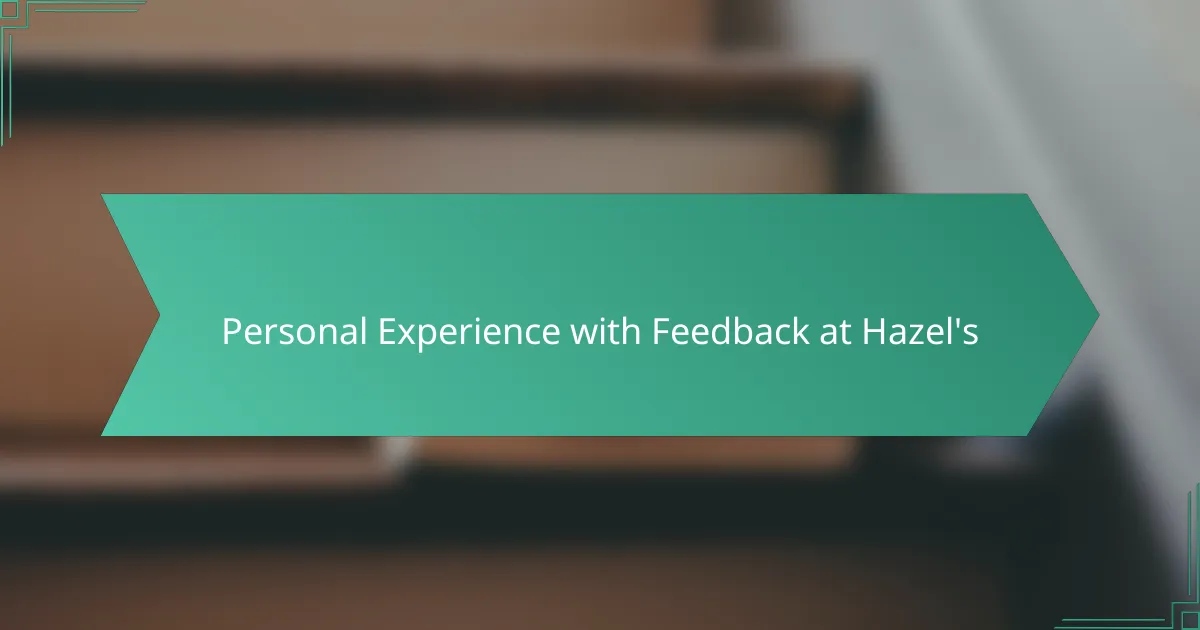
Personal Experience with Feedback at Hazel’s
The first time I shared a short story at Hazel’s workshop, I was both excited and nervous. When the group offered feedback, it felt like a warm spotlight, highlighting parts of my writing I hadn’t noticed before—and not in a critical way, but in an inviting one that made me eager to dig deeper. Have you ever experienced feedback that feels more like a friendly nudge than a harsh critique? That’s exactly how it felt to me.
One moment that stands out was when a fellow writer questioned a character’s decision in my piece. At first, I felt a twinge of defensiveness, but then I realized their insight opened a door I hadn’t thought to explore. It was like discovering a new room in a house I thought I knew well. Since that moment, I’ve come to see feedback at Hazel’s as a chance to uncover surprises within my own stories.
What I appreciate, above all, is the genuine care behind every comment. Hazel fosters an environment where feedback never feels like judgement but rather a shared desire to help each other grow. Doesn’t that kind of support make all the difference when you’re putting your heart on the page? For me, it turns the daunting act of revision into an exciting, collaborative adventure.
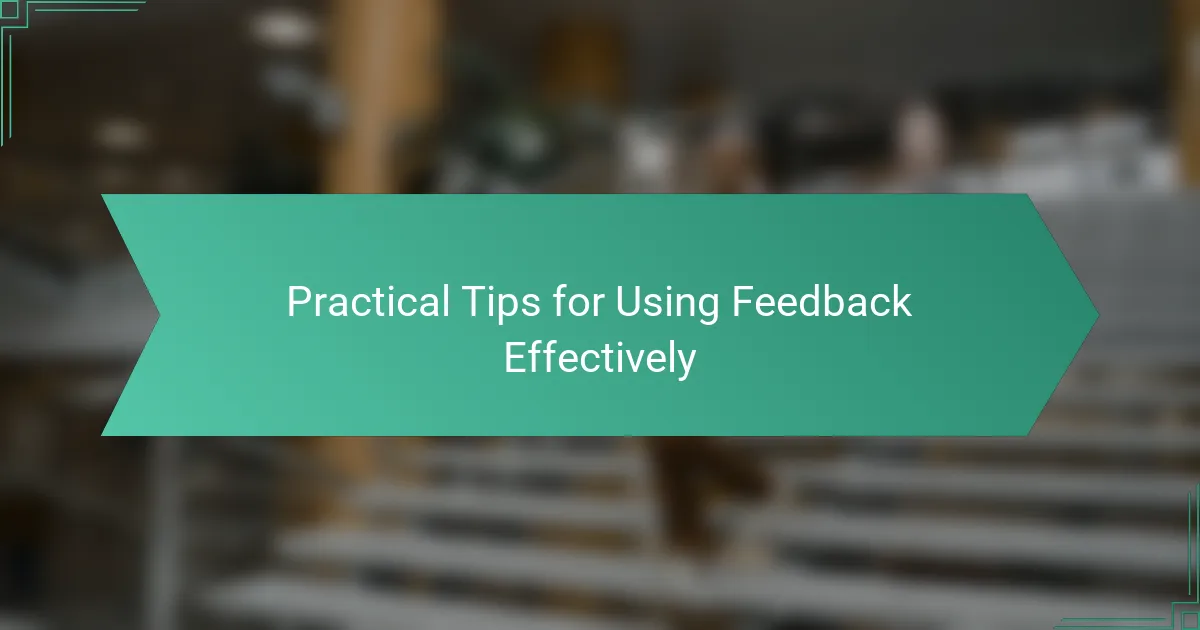
Practical Tips for Using Feedback Effectively
One practical tip I’ve found invaluable is to listen first without immediately reacting. When I do this at Hazel’s workshops, I give myself space to absorb others’ perspectives fully before deciding what truly resonates or challenges me. Have you ever noticed how pausing like that turns feedback from a list of corrections into an invitation for discovery?
Another approach I swear by is taking notes not just on what to fix, but on what excites me about my writing. During one session, I jotted down a peer’s comment about the emotional tone of a scene—it helped me preserve the heart of the piece even as I revised the plot. It’s easy to fixate on problems, but capturing positive feedback keeps me grounded and motivated.
Lastly, I believe in experimenting boldly with feedback rather than feeling locked into it. Hazel encourages us to try suggested changes and see what feels right, then adapt from there. Isn’t writing about exploration after all? When I treat feedback as a tool—one to test and shape of my own making—the revision process becomes less intimidating and far more fun.